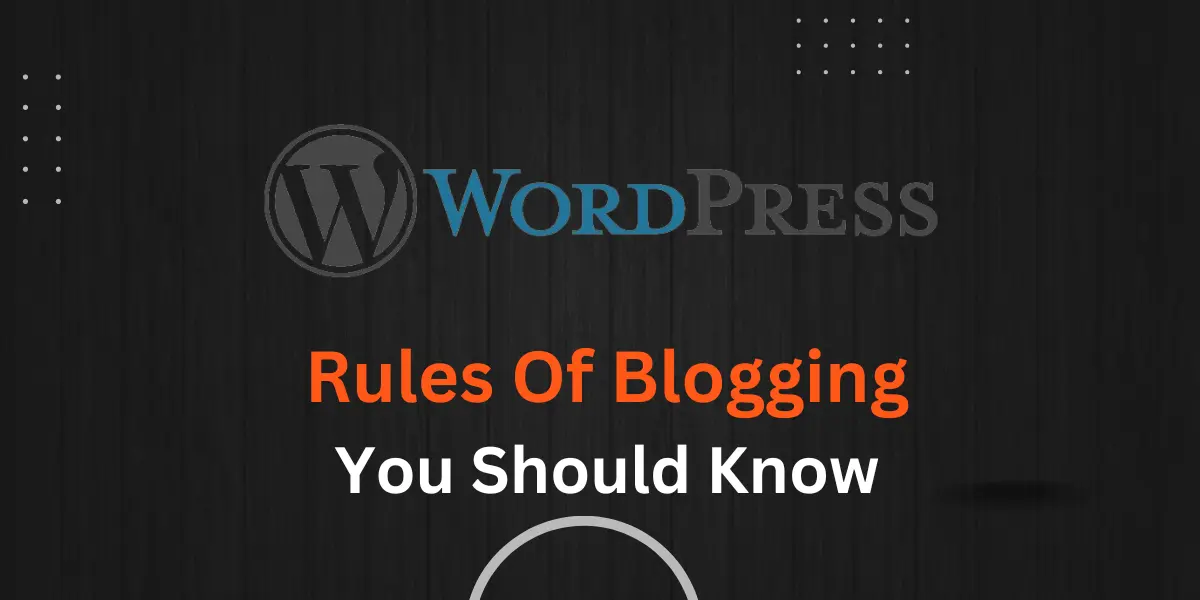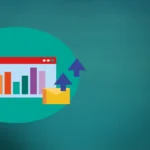When you start blogging using WordPress and join the world of online publishing, you must follow various written and unwritten Blogging rules.
Laws and ethics apply to every blogger, and you must follow them to stay out of legal trouble and remain a welcome member of the blogging community.
This post introduces legal and ethical considerations affecting you as a blogger. You also learn how to create your blog policies and establish a user experience your visitors can rely on.
Additionally, you know how to avoid violating any WordPress policies when blogging.
Table of Contents
Using Links and Providing Attribution
When you write a blog post about a topic you found via another blog or website, you should attribute your source to a link.
Give credit where credit is due. Thanks to WordPress’s trackback function, it is ethical and can help your blog grow.
A trackback is a virtual shoulder tap from one blog to another. When you publish a blog post that includes a link to another blog that has enabled its trackback function, the link to your blog post is published within the comments section of the other blog.
Some other blogging applications, like TypePad, also publish trackbacks, which are not automated.
You need to insert the source URL in the Send Trackbacks To field within your WordPress post editor for those trackbacks to be published on the source blog.
Trackbacks can help boost traffic to your blog because people who read the other blog where the trackback is published can also follow the link to read your blog post.
The trackback also notifies the other blogger that you linked to his content in your post. It’s a great way to reach out to another blogger, show him you helped share his content, and begin to form a relationship with him.
Blogging: Following Copyright Laws
It bears repeating: you must link to and provide attribution for your sources. Copyright laws bind bloggers who publish content on the public Internet.
You don’t want to be accused of plagiarizing another person’s work, so it’s imperative that you always publish original content on your blog and properly cite your sources.
A gray area of copyright law, called fair use, affects bloggers. Under fair use, publishers can republish another person’s content to add commentary or for educational purposes.
However, a blogger’s safest action is to republish snippets from other sources with a link to that source. Also, add your opinion to the snippet so that the vast majority of content on your blog is original.
This guideline will help you avoid legal trouble and ensure your search engine rankings are not negatively affected.
Sites that republish content from other sites are often penalized or banned from search engine results.
What Images Can You Use on Your Blog?
A common question among bloggers—both beginner and seasoned—is related to using images on blogs and in blog posts.
Copyright laws protect the original owner of any work, and images are protected by copyright laws just as words and music are.
It might seem like a great idea to create a celebrity gossip blog and link to pictures you find on entertainment sites, but doing so will likely violate copyright laws.
You need permission to use an image on your blog without violating laws. You can get permission by requesting it from the image owner, or you can find sources that provide images with copyrights attached to them that allow you to republish them on your blog.
The most common copyright licenses you need to understand are rights-managed, royalty-free, and Creative Commons.
Rights-Managed
Rights-managed copyright licenses are based on usage and require that you either pay the owner for the rights to use the images on your blog or get permission to use the photos.
You must pay a fee each time you want to use a rights-managed image. Getty Images is an example of a site that offers rights-managed images.
Royalty-Free
Royalty-free copyrighted images typically come with a price tag, but you can pay one time and use the purchased image again and again.
Some royalty-free images don’t have price tags but restrictions that require you to credit the source or perform other actions to use them as the image owner dictates.
Royalty-free images are often referred to as stock images. An example of a site offering royalty-free images is FreeImages, which provides both photos for free (with restrictions attached) and a fee.
Blogging: Creative Commons
Creative Commons is an organization that helps owners of original works share those works in a less restrictive manner than copyright laws allow.
Creative Commons offers six types of licenses:
- Attribution: Anyone can republish the work with proper attribution to the owner.
- Attribution Share Alike: Anyone can modify the work in any way and republish it with proper attribution to the owner as long as the new version is licensed using the same Creative Commons license as the original work.
- Attribution No Derivatives: If no changes are made, anyone can republish the work with proper attribution to the owner.
- Attribution Non-Commercial: Anyone can republish the work for non-commercial purposes with proper attribution to the owner.
- Attribution Non-Commercial Share Alike: Anyone can modify the work in any way and republish it for noncommercial purposes with proper attribution to the owner as long as the new version of the work is licensed using the same Creative Commons license as the original work.
- Attribution Non-Commercial No Derivatives: Anyone can republish the image for noncommercial purposes with proper attribution to the owner if no changes are made to the work.
Blogging: Be Mindful of Spam
The last thing you want as a blogger is to earn a reputation as a spammer, which you can unintentionally do if you break some of the unwritten rules of WordPress or the blogosphere.
The social web is a great place to promote yourself, your business, and so on, but members of the blogosphere don’t like self-promoters.
The key to growing your blog and online reputation is indirect self-promotion. So then, what does a blogger need to do to promote her blog?
By definition, a spammer is someone who floods the Internet with solicitous messages. This is particularly common on the social web, the term used to describe the evolution of the Internet, where user-generated content and two-way conversations via tools like blogs, Twitter, Facebook, and so on became everyday global communications.
But for now, let’s look at what not to do. Following a few ground rules should keep you from being labeled a spammer.:
- Don’t leave comments on other blogs filled with links. It’s tempting, but don’t do it. Instead, use the URL field in the blog comment form for your self-promotional link.
- Don’t leave comments on other blogs that don’t add value to the conversation. Be sure to say something interesting, or blog owners will think you’re just trying to get a free link back to your blog.
- Don’t clutter other bloggers’ e-mail inboxes with link requests and other self-promotional content. Instead of annoying other bloggers, send them information they’ll find interesting and start to develop a relationship with them that will help you build your blog in the long term.
The more time you spend blogging and reading other blogs, the easier it will be to identify the tactics and behaviors members of the blogosphere frown upon.
Once you gain a reputation as a spammer or a blogger who disregards the ethics of blogging, it’s tough to get off the blogger blacklist.
Blogging: Creating Policies
Your blog is your own space on the web, and depending on your goals, you can publish the type of content you want and not publish the kind of content you don’t want.
That’s where blog policies come into the picture. Policies are intended to protect you and your audience and set expectations about the type of content that will or will not be published on your blog.
You need to establish four primary types of blog policies:
There’s no set format or text you’re required to use in your blog policies— in fact, publishing blog policies is entirely up to you.
However, it’s essential to understand the primary purposes of blog policies and what information is typically found in them so you can create the most appropriate policies for your blog.
Blogging: Comment Policy
As your blog grows and your posts receive more and more comments, you’ll undoubtedly receive comments you don’t want to publish on your blog or that require minor editing before you publish them.
For example, hateful comments that attack individuals usually aren’t welcome on blogs, and comments that include obscenities could be offensive.
Similarly, comments that might be spam can hurt the user experience on your blog and
should be deleted.
A comment policy allows you to define what types of comments you will delete or edit using the comment moderation tools in your WordPress account.
Your comment policy also protects you. You can refer visitors whose comments are edited or deleted to your established policy to understand why they were revised or not published.
Following is a sample blog comment policy. It can help you get started in writing your policy for your blog.
Comments submitted to this blog may be edited or deleted in the following situations:
- Comments that are considered spam or potential spam will be deleted. This includes comments that are irrelevant or with multiple links that are irrelevant to the blog post to which they are attached.
- Comments, including profanity, will be edited or deleted.
- Comments that could be deemed offensive will be deleted.
- Comments that attack a person or entity will be deleted.
The blog owner reserves the right to edit or delete any comments submitted to this blog at her discretion and without notice. This comment policy is subject to change at any time and without notice.
Blogging: Privacy Policy

A privacy policy informs visitors about the information you collect when they visit your blog and what information you share with third parties.
For example, some blog advertising programs require that the advertiser be able to collect and store information about visitors to your blog to serve more appropriate ads in the future.
If you participate in this program, the advertising program will likely require you to publish a privacy policy on your blog explaining the type of information collected about each visitor and what that data is used for.
Be wary of publishing ads from advertisers that collect or share information about visitors to your blog, but do not require that you publish a privacy policy outlining their tactics.
If private information is collected about your blog visitors (even if done by a third-party advertiser), you are legally required to disclose that it’s happening.
Similarly, suppose you use a web analytics tool like Google Analytics or StatCounter to track your blog’s performance based on visitors’ visits. You’re collecting information about visitors’ travels across your blog.
You should publish a privacy policy on your blog that explains the type of information collected and why.
Here’s a generic privacy policy for a blog that tracks analytics but does not collect or share visitor data. Use it to help you create your policy.
“We do not share personal information or behavioral information with third parties. We do not store information we collect about your visit to this blog for use other than to analyze content performance through cookies, which you can turn off at any time by modifying your web browser’s settings. We are not responsible for republishing the content on this blog or other websites or media without our permission. This privacy policy is subject to change anytime and without notice.“
There are many privacy policy generators, including Termly, Free Privacy Policy Generator, Privacy Policy Online, App Privacy Policy Generator, and many more.
You can use those Privacy Generators to create a Cookie Policy, Return Policy, Shipping Policy, Terms and Conditions, and Privacy Policy for your website, app, e-commerce store, SaaS, small business, or any other need. Those are needed to comply with the GDPR, CCPA, PIPEDA, CalOPPA, and more!
Terms and Conditions of Use Policy
To protect yourself, you should publish a terms and conditions of use policy on your blog. This policy should outline everything people agree to by visiting your blog.
You may want to consult an attorney to ensure your blog policies protect you from potential lawsuits and other threats.

Following is a generic sample terms and conditions of use policy you can use to write your own.
“The content provided on this blog is for informational purposes only. The blog’s owner makes no representations of the accuracy or completeness of any information on this site or found by following any link. The owner will not be liable for any errors or omissions in the information available on this site or by following any link on this site nor for the availability of this information. The owner will not be liable for any losses, injuries, or damages from the display or use of this information. These terms and conditions of use are subject to change at any time and without notice.”
Remember that blog policies are meant to accomplish two primary goals: establish visitor expectations and protect you.
Review policies on other blogs, create your own to meet your needs, and provide the complete disclosures and protection you require.
Blogging: WordPress Policies
WordPress has policies users must adhere to or risk having their blogs deleted. This primarily applies to WordPress.com users, but WordPress.org users must follow policies related to using the WordPress application and policies from their web hosting providers.
You can view the WordPress policies on these pages:
- WordPress.com Terms of Service
- WordPress.com Privacy Policy
- WordPress.org Privacy Policy
The WordPress privacy policies apply to you personally and your rights as a WordPress.com or WordPress.org visitor or user.
The WordPress.com Terms of Service apply to anyone who creates a blog on WordPress.com. While these policies seem lengthy and complicated, they’re pretty easy to understand.
Depending on the version of WordPress you use, take the time to read through the policies that apply to you and adhere to them at all times.
KEEP READING:
- READING
- SEO Analytics and Reporting: The Simple Step-by-Step Guide
- Off-Page SEO and Backlinks: Everything You Need to Know
- Keywords Research and Analysis: The Definitive Guide in 2024
- Fundamentals of Search Engines (2024)
- Content Marketing and SEO: How To Use Them Together
- What is SEO? (Search Engine Optimization)
Blogging: Wrapping Up
You must credit your sources and avoid violating copyright laws on your blog. You also must avoid being labeled a spammer or publishing spam on your blog.
If you don’t, you risk gaining a negative reputation among the blogging community or violating WordPress policies.
Publishing your blog policies can protect you from some ethical and legal entanglements. If you use WordPress, you must read and adhere to WordPress’s policies at all times.
That’s all. Let’s meet in the comments column below to discuss your comments and Blogging concerns.
Let us discuss.
If you liked this article, The Essential Rules of Blogging, please follow us on the following Social Network:
- Find Us On Facebook
- Connect with WordPress Experts and other WordPress Users in our free Facebook Community.
- Join Us On Twitter
- Follow Us On the Telegram Group
- Find Us On the WhatsApp Channel
- You can also reach Us by using the Contact Form.
- Also, find Our Blog Page for more tutorials.
- Follow Us On Google News for more updates.


















